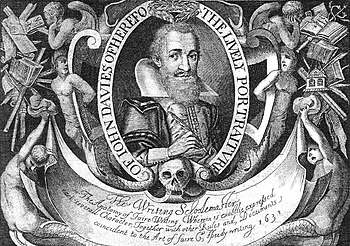John Davies of Hereford

John Davies of Hereford (c. 1565 – July 1618) was a writing-master and an
Davies wrote very copiously on theological and philosophical themes, some of which brought proto-scientific ideas into the public arena.[1] He also wrote many epigrams on his contemporaries which have some historical interest. John Davies died in London.
Davies was a friend of Edmund Ashfield, and wrote in an epigram that he nearly accompanied Ashfield on his journey to Scotland in 1599.[2]
Works

- Mirum in Modum, a Glimpse of God's Glory and the Soul's Shape (1602)
- Microcosmos (1603)
- Wittes Pilgrimage (1605?)
- Bien Venu (1606)
- Summa Totalis (1607)
- Humours Heav'n on Earth (1609)
- The Holy Roode (1609)
- The Scourge of Folly (1611)
- The Muse's Sacrifice (1612)
- The Picture of a Happy Man (1612)
- A Select Second Husband for Sir Thomas Overburie's Wife (1616)
- Wit's Bedlam (1617)[3]
These rare editions were compiled by Reverend Alexander Balloch Grosart (1827–1899) into a two-volume edition privately printed in one hundred copies in 1875 and 1878 at the Edinburgh University Press by Thomas and Archibald Constable as part of the "Chertsey Worthies' library" subscription series. The complete works of John Davies of Hereford (15??-1618) was "for the first time collected and edited: with memorial introduction, notes and illustrations, glossarial index, and portrait and facsimile, &c." Grosart indicated for several of the poems that there was only one extant copy known.[4]
A Lover's Complaint
In a 2007 monograph, Shakespeare, "A Lover's Complaint," and John Davies of Hereford,
References
 This article incorporates text from a publication now in the public domain: Cousin, John William (1910). A Short Biographical Dictionary of English Literature. London: J. M. Dent & Sons – via Wikisource.
This article incorporates text from a publication now in the public domain: Cousin, John William (1910). A Short Biographical Dictionary of English Literature. London: J. M. Dent & Sons – via Wikisource.
- Specific
- ISBN 0-415-15719-6.
In a series of long poetico-philosophical treatises - Mirum in Modum (1602), Microcosmos (1603), Summa Totalis (1607) - Davies of Hereford presented his vision of a harmonized science of the universe and the human body. These three texts, taken together, formed a unified project, a vast syncretic enterprise which surveyed all of human knowledge in an effort to achieve a theologically ordered prospectus of the world.
- ^ Henry Alfred Napier, Historical Notices of the Parishes of Swycombe and Ewelme (Oxford, 1858), pp. 358-9.
- ^ Vickers, Brian. Shakespeare, A Lover's Complaint, and John Davies of Hereford. Cambridge: Cambridge University Press, 2007. pp. 23–30.
- OL 4977205W.
External links
- John Davies of Hereford Encyclopædia Britannica
- Complete Works of John Davies of Hereford Vol. 1, Vol. 2
